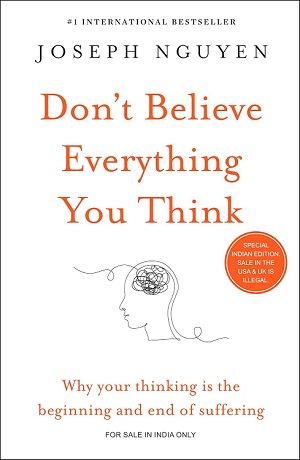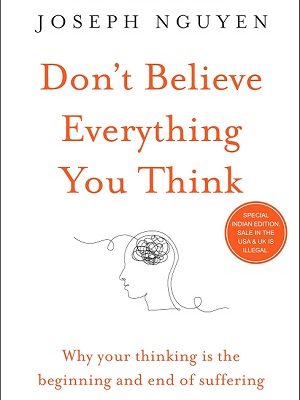Don’t Believe Everything You Think by Joseph Nguyen is a thought-provoking book that challenges the reader’s perception of reality, thoughts, and the mind itself. The book explores the nature of thinking, the impact of thoughts on our emotions and actions, and offers strategies to gain control over our minds. Below are the 20 key lessons from the book:

Read: What You Think You Become
1. The Illusory Nature of Thoughts
Key Insight: The book emphasizes that not all thoughts are true or reflective of reality. Our minds generate countless thoughts, many of which are distorted, exaggerated, or based on misconceptions. Believing every thought leads to unnecessary suffering and confusion.
Actionable Tip: Develop mindfulness by observing your thoughts without immediately accepting them as truth. Question the validity of negative or distressing thoughts, and challenge any assumptions that may be causing you harm.
2. The Power of Perspective
Key Insight: Perspective shapes how we experience life. The book highlights that changing your perspective on a situation can alter your emotional response and overall experience. By shifting your perspective, you can gain a more balanced and constructive outlook.
Actionable Tip: When faced with a challenging situation, try to view it from different perspectives. Ask yourself how someone else might see the situation or what positives could come from it. This practice can help you maintain emotional equilibrium and find solutions.
3. Detaching from Negative Thoughts
Key Insight: Detachment from negative thoughts is essential for mental peace. Nguyen explains that we don’t have to engage with every thought that arises. By learning to detach, we can prevent negative thoughts from taking control of our emotions and actions.
Actionable Tip: Practice detachment by observing your thoughts as if you were an impartial spectator. Acknowledge the presence of negative thoughts but avoid getting caught up in them. This distance can reduce their impact on your mood and behavior.
4. The Role of Awareness in Thought Management
Key Insight: Awareness is the foundation of managing thoughts effectively. By cultivating awareness, you can recognize when your mind is generating unhelpful or irrational thoughts and choose how to respond to them.
Actionable Tip: Enhance your awareness through mindfulness practices such as meditation or deep breathing exercises. These practices can help you become more attuned to your thought patterns and allow you to intervene before negative thoughts spiral out of control.
5. Understanding the Mind’s Biases
Key Insight: The mind is inherently biased, often leading us to interpret situations in ways that confirm our existing beliefs or fears. Nguyen discusses common cognitive biases, such as confirmation bias, that distort our thinking.
Actionable Tip: Educate yourself about cognitive biases and how they affect your thinking. When making decisions or forming opinions, consciously check for biases that might be influencing your judgment.
6. The Impact of Language on Thought
Key Insight: Language shapes our thoughts and perceptions. The words we use to describe our experiences can reinforce certain beliefs and emotions, both positive and negative.
Actionable Tip: Pay attention to the language you use in your self-talk. Replace negative, limiting language with more positive and empowering words. This can help shift your mindset and improve your overall outlook.
7. Embracing Uncertainty
Key Insight: Life is inherently uncertain, and the mind often struggles with this fact, leading to anxiety and stress. Nguyen emphasizes that accepting and embracing uncertainty can lead to greater peace and flexibility.
Actionable Tip: Practice acceptance of uncertainty by focusing on what you can control and letting go of the need for absolute certainty. Embrace change as an opportunity for growth rather than a threat.
8. The Relationship Between Thoughts and Emotions
Key Insight: Thoughts and emotions are deeply interconnected. The book explains that our emotions often stem from the thoughts we entertain. By altering our thoughts, we can influence our emotional state.
Actionable Tip: When experiencing a negative emotion, trace it back to the underlying thought. Challenge that thought and reframe it in a more positive or realistic way to improve your emotional well-being.
9. Breaking Free from Mental Conditioning
Key Insight: Much of our thinking is the result of mental conditioning, shaped by past experiences, culture, and societal norms. This conditioning can limit our potential and cause us to live according to others’ expectations rather than our own true desires.
Actionable Tip: Reflect on the beliefs and values that guide your life. Identify those that may be the result of external conditioning rather than your own conscious choice. Work on redefining your beliefs to align with your authentic self.
10. The Importance of Present-Moment Awareness
Key Insight: The mind often dwells in the past or worries about the future, leading to stress and discontent. Nguyen highlights the importance of grounding yourself in the present moment to reduce mental clutter and enhance your quality of life.
Actionable Tip: Practice present-moment awareness by focusing on your immediate surroundings, sensations, and actions. Use mindfulness techniques such as deep breathing or grounding exercises to anchor yourself in the here and now.
11. Releasing the Need for Control
Key Insight: The need for control is a common source of stress and frustration. The book teaches that releasing the need for control over every aspect of life can lead to greater inner peace and adaptability.
Actionable Tip: Identify areas in your life where you have an excessive need for control. Practice letting go by trusting the process and accepting that not everything is within your power to manage.
12. The Power of Intention
Key Insight: Intention is a powerful tool for directing your mind and actions. Setting clear, positive intentions can help guide your thoughts and behavior toward achieving your goals.
Actionable Tip: Begin each day by setting an intention that aligns with your goals and values. Keep this intention in mind throughout the day to guide your decisions and actions.
13. Mindfulness as a Tool for Thought Mastery
Key Insight: Mindfulness is a key practice for mastering your thoughts. By staying present and aware, you can observe your thoughts without judgment and choose how to respond to them.
Actionable Tip: Incorporate mindfulness practices into your daily routine, such as mindful eating, walking, or breathing. These practices can help you develop greater control over your thoughts and reactions.
14. The Influence of Environment on Thinking
Key Insight: Your environment significantly influences your thoughts and mental state. Nguyen discusses how the people you surround yourself with, the media you consume, and your physical surroundings can shape your mindset.
Actionable Tip: Evaluate your environment and make adjustments to support a more positive and productive mindset. Surround yourself with uplifting people, limit exposure to negative media, and create a physical space that promotes calm and focus.
15. The Value of Self-Compassion
Key Insight: Self-compassion is crucial for maintaining a healthy relationship with your mind. Nguyen emphasizes the importance of being kind to yourself, especially when dealing with negative thoughts or difficult emotions.
Actionable Tip: Practice self-compassion by treating yourself with the same kindness and understanding you would offer to a friend. When you encounter negative thoughts, respond with self-encouragement rather than self-criticism.
16. The Role of Curiosity in Mental Freedom
Key Insight: Curiosity can be a powerful antidote to rigid thinking and mental stagnation. Nguyen encourages cultivating a curious mindset to explore new ideas, perspectives, and possibilities.
Actionable Tip: Approach life with curiosity by asking questions, seeking new experiences, and being open to learning. This mindset can help you break free from limiting beliefs and discover new ways of thinking.
17. Overcoming the Fear of Failure
Key Insight: The fear of failure is a common mental obstacle that can prevent you from taking risks and pursuing your goals. The book teaches that failure is a natural part of growth and should be embraced rather than feared.
Actionable Tip: Reframe your perspective on failure by seeing it as a learning opportunity rather than a setback. When you encounter failure, reflect on the lessons it offers and use them to improve your future efforts.
18. The Power of Letting Go
Key Insight: Letting go of attachment to outcomes, expectations, and material possessions can lead to greater mental freedom and peace. Nguyen discusses the benefits of detachment in achieving a more balanced and fulfilling life.
Actionable Tip: Practice letting go by releasing your attachment to specific outcomes or desires. Focus on the process rather than the end result, and trust that things will unfold as they are meant to.
19. Cultivating Mental Resilience
Key Insight: Mental resilience is the ability to bounce back from challenges and adversity. The book emphasizes that resilience can be developed through conscious practice and a positive mindset.
Actionable Tip: Build mental resilience by focusing on your strengths, maintaining a positive outlook, and practicing self-care. When faced with challenges, remind yourself of your ability to overcome obstacles and grow from the experience.
20. Living Authentically
Key Insight: Authenticity involves living in alignment with your true self, values, and beliefs. Nguyen encourages readers to strip away societal expectations and mental conditioning to discover and embrace their authentic selves.
Actionable Tip: Reflect on your core values and passions. Make choices that align with your true self, even if they go against societal norms or others’ expectations. Living authentically leads to greater fulfillment and inner peace.
Conclusions
By applying these lessons from Don’t Believe Everything You Think by Joseph Nguyen, you can gain greater control over your thoughts, reduce mental clutter, and live a more authentic, fulfilling life. The book’s insights provide practical strategies for questioning your thoughts, embracing uncertainty, and cultivating a positive, resilient mindset. Whether you are seeking to improve your mental health, relationships, or overall well-being, these lessons offer a comprehensive guide to mastering your mind and creating the life you desire (Amazon).



